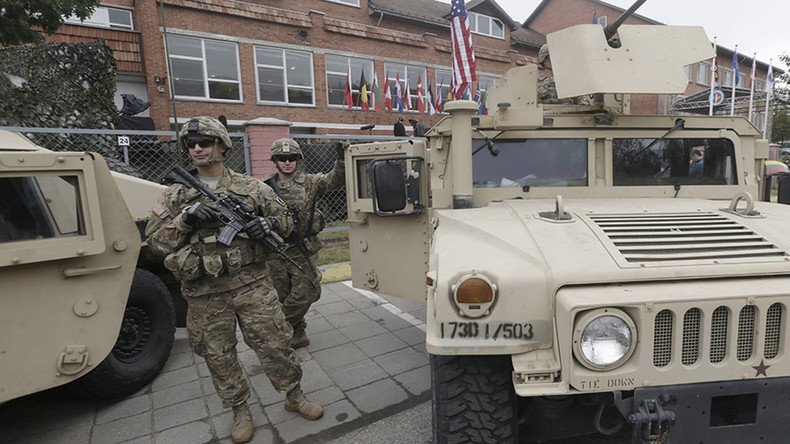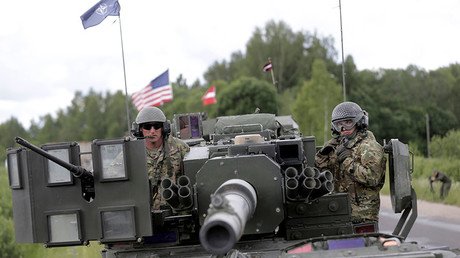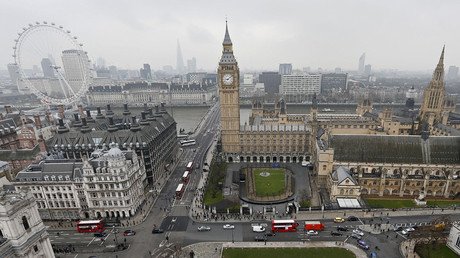The bully as the good guy: The looking-glass world of NATO’s threats to Russia

Let’s suppose an enemy is out to get you. He bought houses on your street and amassed his armed gangs on the edge of your property, despite promising not to. He also attempted to ruin you financially, by trying to get businesses and banks not to deal with you.
You respond to this bullying by placing missiles in your garden and get your friends round to defend your house. Your enemy then plays the victim and accuses you of 'aggression' and trying to start a conflict.
Sounds like pretty outrageous behavior, don’t you think? But that's exactly what NATO is doing today to Russia.
Last Sunday, 4,000 troops from the NATO alliance took part in operation ‘Iron Sword 2016’ in Lithuania, the largest such maneuvers to date. Also, 4,000 more troops are being deployed in Poland and the Baltic states.
Now, if I were a Russian citizen, I’d be pretty alarmed by NATO‘s Drang Nach Osten. The NATO deployments are after all the largest massing of foreign troops on Russia’s borders since 1941, when the Nazis invaded and killed 27 million Russian and Soviet citizens. There’s still quite a few Russians around who can remember those dark days and don‘t want them repeated.
But, guess what, when Russia responds to NATO’s hostile acts by sensibly deploying Iskander missiles and air defenses in Kaliningrad, the US State Department says Russia has nothing to worry about! NATO, we’re told is only responding to Russian ‘aggression’. We’ve entered the looking-glass world of Lewis Carroll when those threatening the peace are posing as the good guys, while those who are defending their country from attack are billed as ’aggressors’ who we have to be terrified of.
Everything about the NATO ‘defensive’ narrative is false, in the same way, that everything about the Nazi narrative in 1941 was too. Any objective analysis of the situation, which takes in the historical background, will arrive at the conclusion that it’s NATO which is threatening Russia, and not the other way round.
Take the events in Ukraine, which are cited as a justification for NATO‘s recent troop build-ups. In NATO and the EU, the toppling of the Yanukovych government was depicted as a victory for ‘people power.' Russia then ‘invaded’ Ukraine to seize Crimea. That ‘aggressive’ act by the 'Big Bad Bear' showed us that not only Moscow needed to be sanctioned, but that we needed more NATO deployments in Eastern Europe to stop further Russian land-grabs. In fact, Ukraine was an example of Western, and not Russian, expansionism. The US and EU choreographed and financed the ousting of a democratically elected government, to bring ‘their’ favored politicians to power and push the country into the NATO/EU orbit. Here we can listen to Victoria Nuland of the State Department and US Ambassador Geoffrey Pyatt discussing who should and shouldn't be in the new, ‘democratic’ Ukrainian government.
With the government, many of them had voted for being illegally overthrown, and violent neo-Nazi thugs rampaging on the streets, the predominantly Russian population of Crimea quite understandably said ‘Enough is Enough’- and voted to rejoin Russia in a referendum. This exercising by the people of Crimea of their democratic rights was portrayed by NATO propagandists in the West as ‘Russian aggression,' but it was the imperialist NATO powers, and not Moscow, who had provoked a crisis. And not for the first time.
NATO poses as a guarantor of peace and security, but in fact, its warmongering has made Europe and the world a much more dangerous place.
Think back to 1999 and the 78-day bombing of socialist Yugoslavia. Then the alliance broke not only international law but its own constitution, which only allowed the use of force when a member state was attacked.
The bombing caused a humanitarian crisis and left much of the infrastructure of Yugoslavia destroyed. The people of the region are still dealing with the after-effects of NATO dropping around 15,000 tons of depleted uranium on them.
And remember, this was supposed to have been a ‘humanitarian‘ intervention.
Then in 2011 NATO attacked Libya, transforming the country with the highest living standards in Africa into a failed state. The toppling of Gaddafi turned Libya into a haven for ISIS and other extremist groups and helped to instigate a refugee/migrant exodus of Biblical proportions. It also destabilized surrounding countries such as Tunisia, where, in 2015, 38 tourists, 30 of them British, were slaughtered on the beach in a terrorist attack. NATO helping to keep us safe? What a sick joke.
As many old Cold War 1.0 warriors have argued, NATO should have been consigned to the dustbin of history in 1991, at the same time the Warsaw Pact was torn up.
But instead, it morphed into the expansionary war-machine it is today.
Just imagine for a moment if the situation had been reversed. That back in the 90s, Russia had kept the Warsaw Pact going, while NATO had been scrapped. Imagine if Russia, breaking promises it had made to the West, had spent the past 20 years expanding the Warsaw Pact right up to the borders of the US. And that in 2014, the Kremlin had orchestrated a coup in Canada to bring to power a new pro-Russian government, with extreme anti-American forces at the forefront of the ’revolution.' Would establishment commentators be saying Russia was acting in ’self-defense,’and that the US and its allies had nothing to worry about? I think not.
Probably the most obnoxious thing about Western policy toward Russia is the refusal to acknowledge the country which suffered more than any other in World War Two has any legitimate security interests at all. ’We’ can put our troops right on Russia’s borders, but if the Kremlin responds by deploying missiles- well, they’re the ones who are ’paranoid.'
This is the psychology of the school-yard bully, who thinks he can harass, taunt and threaten all he likes- while his victim has no right to retaliate.
Only the bully has rights, not those whom he persecutes. The victim’s concerns are haughtily dismissed. And so it is with Russia.
If things were bad enough before the US Presidential election, since November 8 they’ve got a whole lot worse. The possibility that President Donald Trump might ’reset’ relations with Moscow, and work together with Vladimir Putin to smash ISIS, which most sane people around the world would love to see, seems to have induced something of a wild panic among Western bear-baiters. We‘ve had McCarthyite reports from the NATO-linked Atlantic Council and the Henry Jackson Society,
and an increase in anti-Russian rhetoric from the usual suspects.
But the problem the Russia-bashers have is public opinion. Americans and Europeans want jobs, decent well-paid jobs and not policies which will propel us into World War Three.
Western politicians who have called for better relations with Russia have been doing extraordinarily well in elections, with Donald Trump only the latest example. Rather than turning the public against them elite attacks on those who reject Cold War 2.0- and the labeling of them as ‘Putin stooges/Russian agents,' only seems to increase their appeal.
So Brexit, Trump, Arron Banks, UKIP, Stop the War, Corbyn, Le Pen- all part of a Russian plot. The Establishment must think we're morons.
— Neil Clark (@NeilClark66) November 24, 2016
France is likely to break with its current anti-Russian stance after next year’s Presidential election, with both Francois Fillon and Marine Le Pen, opposing NATO’s aggressive policies. While in Britain, Labour leader Jeremy Corbyn, a veteran peace campaigner, has called for Western leaders to demilitarize the borders between Russia and Eastern Europe. Meanwhile, the man most likely to be the next leader of UKIP, Paul Nuttall, has also made his position on Russia clear, and it‘s not a neocon one. In Germany, Angela Merkel’s popularity ratings have slumped jeopardizing her chances of winning a fourth term in office next year.
The anti-Russian hawks are in trouble as the political map in the west is being redrawn, and ‘extreme center‘ politicians receive their marching orders from disgruntled voters. NATO’s Drang Nach Osten can be reversed and hopefully, genuine people power will achieve it.
Follow Neil Clark @NeilClark66
The statements, views and opinions expressed in this column are solely those of the author and do not necessarily represent those of RT.















